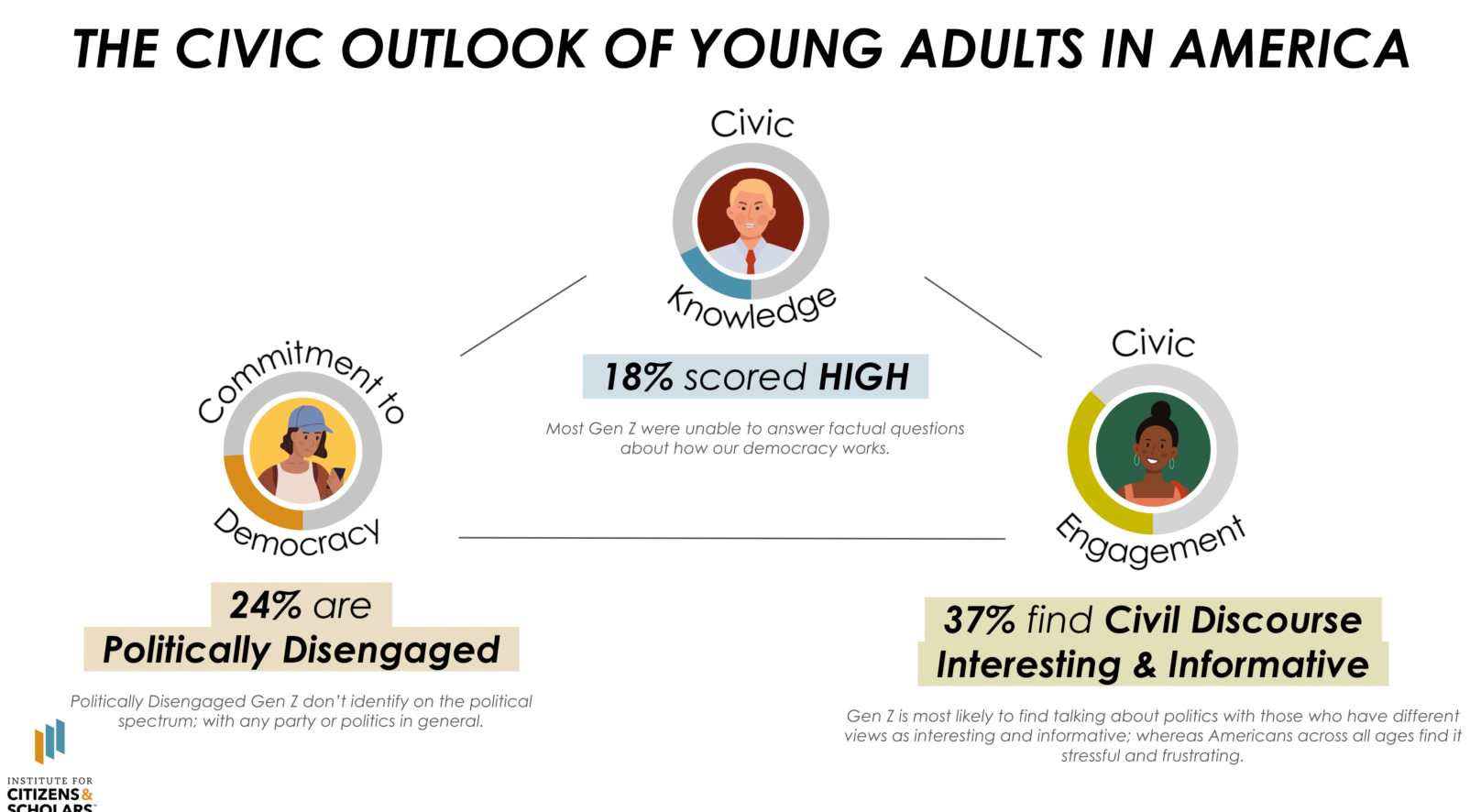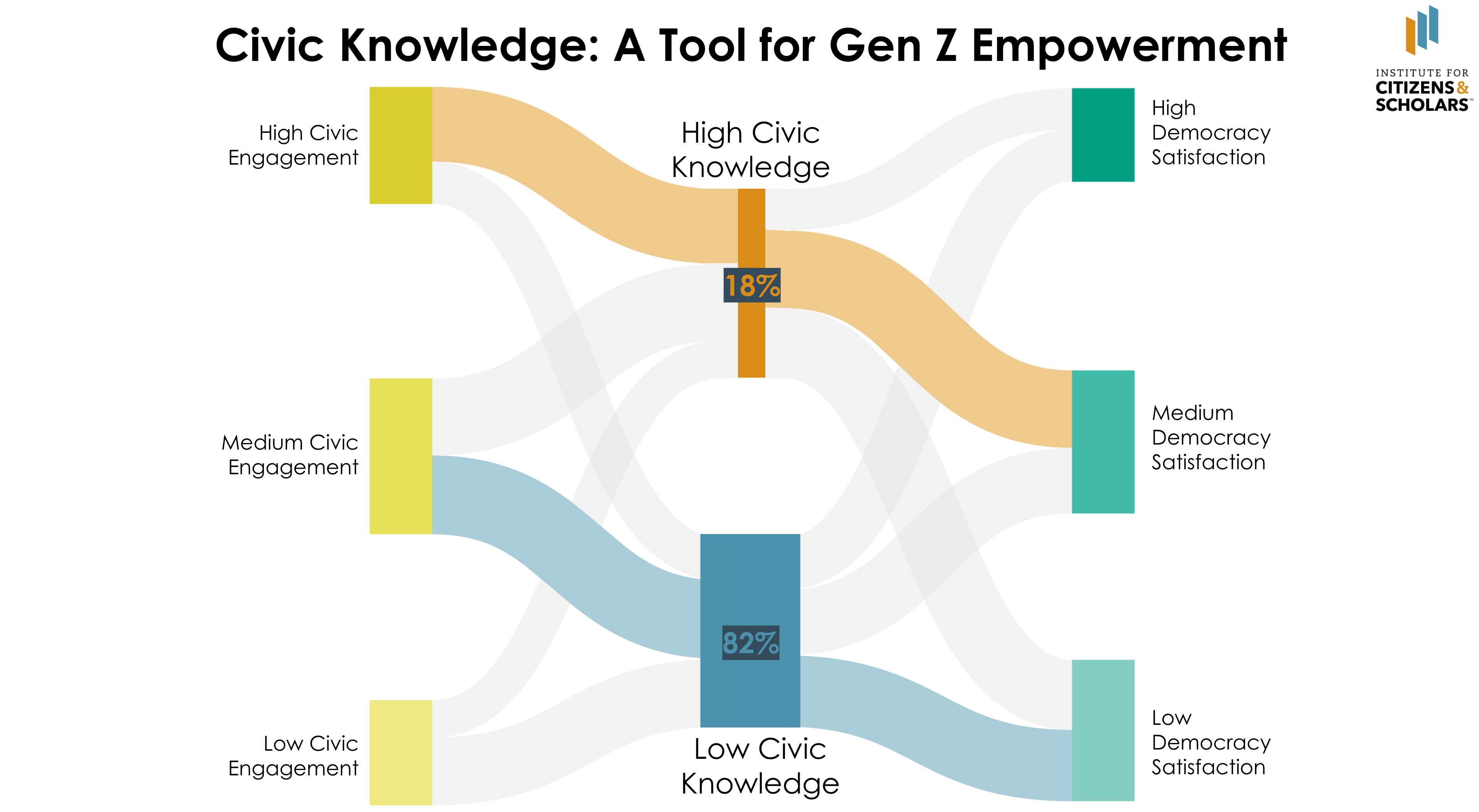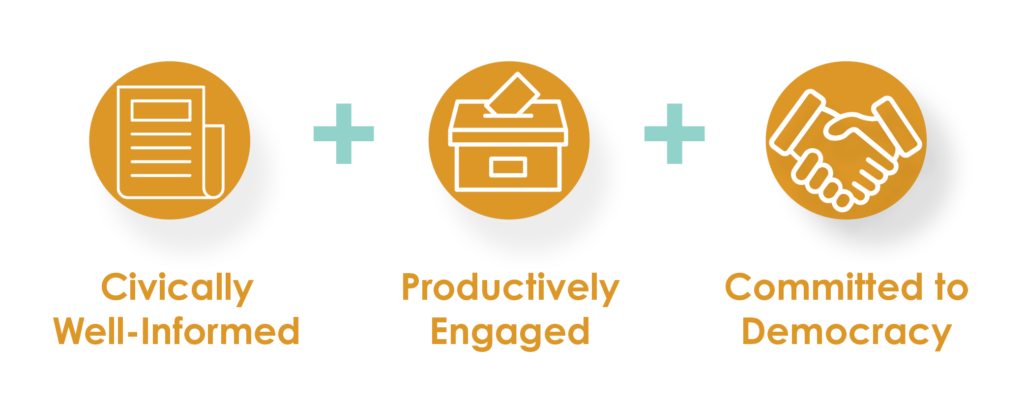Civic Readiness Insights

The Civic Outlook of Young Adults in America is a first-of-its-kind national survey of 18–24-year-old Americans that sheds light on their civic knowledge, engagement, and commitment to democracy. Part of our multi-year research initiative to measure holistic youth civic preparedness in America, Citizens & Scholars commissioned Citizen Data to conduct a poll that surveyed 4,008 young adults across the country.
Civic Readiness Insights
The research reveals a strong correlation between increased civic knowledge and engagement in our democracy:
- 66% of those who score high on civic knowledge intend to vote in the next general election versus only 44% of those who score low on civic knowledge.
- 51% of those who score high on civic knowledge state that their vote matters versus only 47% of those who score low on civic knowledge.
- 80% of those who score high on civic knowledge plan to engage in at least one civic activity in 2024 versus only 64% of those who score low on civic knowledge.
- 62% of those who score high on civic knowledge reject violence that suppresses opposition versus only 49% of those who score low on civic knowledge.

On Civic Knowledge:
- High scoring respondents indicated less pride in an American identity than low scorers.
- High scoring respondents were more likely to indicate that democracy is defined by traditional components of democracy, such as elections, and rule by/of/for the people than low scorers who were more likely to indicate equality, justice, and fairness.
- High scoring respondents were more likely to indicate that engagement with those they disagree with is stressful and frustrating than low scorers.
- Low scorers were more likely to indicate engagement with those they disagree with is interesting and informative.
- High scoring respondents were substantially more likely to indicate an intention to vote in both primary and general elections in 2024 than low scorers.
- High scoring respondents were more likely to indicate that a lack of time prevents their further engagement. Low-scoring respondents were more likely to indicate that they don’t feel informed enough to engage.

Snapshot: Civic Knowledge a Tool for Gen Z Empowerment [enlarge image]
On Civic Engagement:
- Respondents engaging in zero civic activities are more likely to be open to violence.
- Higher civic engagement levels translate into more trust across the board, though the distribution was the same comparing “some” and “no” levels of civic engagement.
- Those reporting no civic engagement activities are less likely to have clearly formed definitions for democracy across the board (meaning they checked multiple different response options), but have a greater likelihood of prioritizing liberty.
- Those who are more engaged are more likely to place elections relatively higher in their definitions of democracy than those with no civic engagement activities.
- Those engaging in no civic activities are more likely to view politics as boring/ pointless or unsure than those reporting some civic engagement.
- Respondents reporting no civic engagement reported more community engagement. This is why there is no correlation between civic engagement (perhaps perceived as being more political in nature) and community engagement.
On Civic Commitment:
- Lower democracy satisfaction is coupled with lower trust in other generations, while the trustworthiness of institutions is the same for any satisfaction level.
- Lower satisfaction levels are coupled with lower American pride.
- Across all democracy satisfaction levels, the respondents’ definitions of democracy: equality, justice, and fairness; are largely the same.
- Respondents with high satisfaction are more likely to find conversations with those they disagree with more interesting/informative; while those with low satisfaction find it more stressful/frustrating.
- Less satisfied respondents report a higher likelihood of voting than those with higher satisfaction. Those with higher satisfaction report more plans to engage in non-voting political activities than those who are less satisfied.
- Less satisfied respondents report they don’t participate in politics because people don’t listen to each other. Those with high satisfaction say they don’t feel informed enough and don’t have enough time to participate.


Analysis, Toplines & Crosstabs
Get access to the executive summary, key insights, toplines, and crosstabs of the survey.
ExploreStay Engaged
Join Us
Join our mailing list to get resources, tools, perspectives, stories, and more from people working to cultivate the next generation of engaged citizens.
More Resources
Our Civic Learning Resource Hub is a one-stop-shop of the best reports, research, white papers, and other resources from around the civic space.
Explore